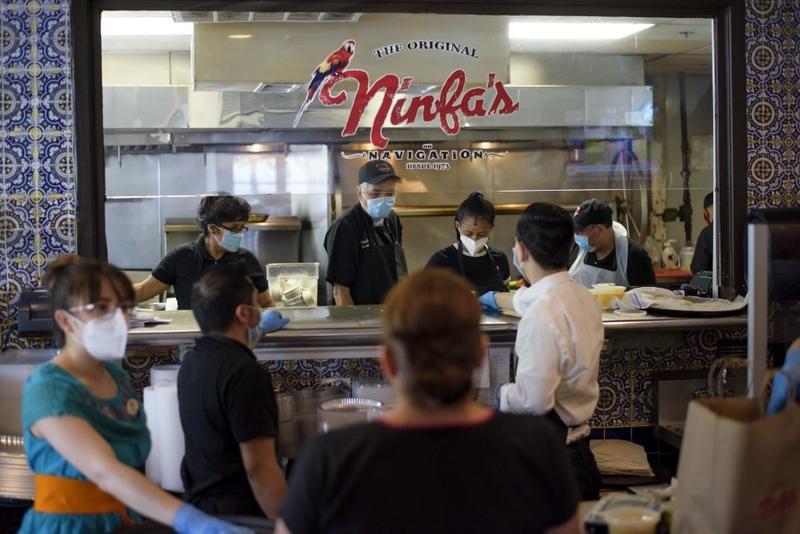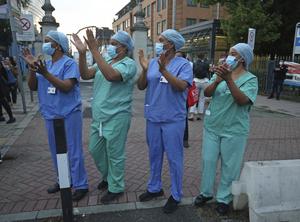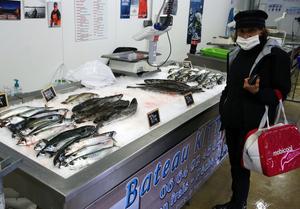 Servers at The Original Ninfa's wear gloves and masks while bringing takeout orders to the kitchen amid the novel coronavirus pandemic on May 1, 2020 in Houston, Texas. Texas on Friday became the largest US state to begin easing coronavirus lockdown measures despite reporting a single-day high in deaths. Stores, restaurants, movie theaters, malls, museums and libraries were allowed to reopen in the Lone Star State but with limited occupancy -- just 25 percent of their capacity. (MARK FELIX / AFP)
Servers at The Original Ninfa's wear gloves and masks while bringing takeout orders to the kitchen amid the novel coronavirus pandemic on May 1, 2020 in Houston, Texas. Texas on Friday became the largest US state to begin easing coronavirus lockdown measures despite reporting a single-day high in deaths. Stores, restaurants, movie theaters, malls, museums and libraries were allowed to reopen in the Lone Star State but with limited occupancy -- just 25 percent of their capacity. (MARK FELIX / AFP)
HOUSTON / LONDON / MOSCOW / PARIS / DUBLIN / WINNIPEG / RIO DE JANEIRO / CAPE TOWN — Americans in about half of US states, led by Texas and Georgia, began emerging on Friday from home confinement while California and New York held fast to business closures and other restrictions imposed in the face of the coronavirus pandemic.
Texas on Friday began a phased-in reopening of businesses shuttered more than a month ago, with restaurants, retail stores and malls allowed to open at 25 percent capacity
Texas on Friday began a phased-in reopening of businesses shuttered more than a month ago, with restaurants, retail stores and malls allowed to open at 25 percent capacity. A second phase is planned for May 18 if infection rates continue to decline.
Across Texas, major employers were putting plans in place to bring staff back to their offices.
Chevron Corp has not yet made decisions on timing or locations, spokesman Sean Comey said, but the oil company is working on guidelines for the restart.
“Some workers are eager to get back to the office,” said ConocoPhillips spokesman John Roper. Conoco alerted its 2,500 Houston-area workers on Thursday it will reopen its corporate headquarters in phases beginning May 11.
About half of US states, joined by some local jurisdictions, have moved toward at least partial lifting of shutdowns as the number of new COVID-19 cases began to drop or level off. Governors have been under pressure from citizens agitating for relief from the restrictions as US Department of Labor data this week showed some 30 million Americans have sought unemployment benefits since March 21.
As of Friday, the number of known infections nationwide had climbed to more than 1 million, including nearly 64,000 deaths, according to a Reuters tally.
Canada
The Canadian province of Alberta on Friday launched the country’s first phone app to trace contacts of people infected with the coronavirus, as the country slowly restarts its economy.
Increased testing and contact tracing are key parts of plans to reopen economies that have largely closed to slow the pandemic’s spread, with no proven vaccine or treatment available.
Currently, contact tracing is done manually, by asking infected patients to recall with whom they have interacted.
Alberta’s voluntary app, called ABTraceTogether, uses Bluetooth wireless technology to identify phones, which also have the app installed, that have come into 2-metre contact with an infected person for at least 15 minutes within a 24-hour period.
Once a person with the app becomes infected, Alberta Health Services will ask the person to upload encrypted data that will allow tracing workers to reach others who have been in close contact.
No geo-location data is collected, and data about encounters are stored encrypted on phones.
Canada’s death toll rose less than 5 percent on Friday to 3,223 deaths, while cases climbed to nearly 54,000, as daily numbers continue to flatten.
Brazil
The Brazilian city of Rio de Janeiro opened on Friday its second field hospital to serve patients infected with COVID-19, as the pandemic has put a strain on the city's public hospital network.
It is the largest field hospital of the nine planned to be installed in the city, with facilities occupying 13,000 square meters at the Riocentro convention center. The new field hospital has 500 hospital beds, including 100 in the intensive care unit (ICU) and 15 for the hemodialysis unit.
The first field hospital in Rio de Janeiro was inaugurated on April 25 in the southern neighborhood of Leblon, with a 200-bed capacity. A third field hospital will be opened next week in the Maracana soccer stadium, with 400 beds, including 80 for the ICU.
Rio de Janeiro State Governor Wilson Witzel has promised 1,800 hospital beds in field facilities by the end of May.
Rio de Janeiro state has been severely affected by the COVID-19 pandemic, second only to Sao Paulo. As of Thursday, the state of Rio de Janeiro had registered 9,453 confirmed cases and 854 deaths.
 Hospital staff outside King's College Hospital in Camberwell, south London, April 30, 2020, during the weekly "Clap for our Carers". (JONATHAN BRADY/PA VIA AP)
Hospital staff outside King's College Hospital in Camberwell, south London, April 30, 2020, during the weekly "Clap for our Carers". (JONATHAN BRADY/PA VIA AP)
UK
The British government will give companies guidance in within days on how to return to work safely once the coronavirus lockdown is eased, as it comes under pressure from business not to withdraw its financial support too soon.
Firms will get advice on different types of workplace activity, including operating outdoors or inside someone else’s home, according to two people with knowledge of the government’s plans. The guidance will also address whether employees need to wear protective equipment and how transport should be used, said the people, who asked not to be identified because they weren’t authorized to speak publicly.
Britain did not change its criteria for recording coronavirus tests to meet its goal to carry out 100,000 tests per day by the end of April, the adviser in charge of the operation said on Friday
Boris Johnson has pledged a “comprehensive plan” to lift the lockdown that has crippled the British economy now the country has passed the peak of the disease.
Britain has hit its target of carrying out 100,000 COVID-19 tests a day, health minister Matt Hancock said on Friday, stressing that the programme was crucial to helping ease a national lockdown.
Hancock also announced that the British death toll had risen by 739 to 27,510 deaths - just below that of Italy which was one of the first and worst-hit European states.
Hancock set the target of reaching 100,000 tests by the end of April after being criticised for moving too slowly on mass testing compared to other countries like Germany.
Since then, the government has increased the number of drive-through testing sites, begun sending out home tests and has rapidly expanded the number of people eligible to apply for a test.
At a news conference on Friday, Hancock said 122,347 tests were conducted in the 24 hours to 0800 GMT.
Germany
The number of confirmed coronavirus cases in Germany rose by 945 to 161,703, data from the Robert Koch Institute (RKI) for infectious diseases showed on Saturday.
The death toll rose by 94 to 6,575.
France
French President Emmanuel Macron warned on Friday that ending the national lockdown on May 11 would be only a first step for France to pull out of the coronavirus crisis, for which his handling faces mounting criticism.
From May 11, schools will gradually reopen and businesses will be free to resume operations after the country’s 67 million population has been in confinement since mid-March
From May 11, schools will gradually reopen and businesses will be free to resume operations after the country’s 67 million population has been in confinement since mid-March.
The government has said it is prepared to slow or delay the unwinding of the lockdown if the virus infection rate spikes markedly higher, with administrative departments divided into ‘red’ and ‘green’ zones.
Northeastern France, including the Paris region, has been especially hard hit, while swathes of the west and south of the country have barely been impacted, raising a dilemma for the government over how to ease the lockdown ahead of the busy summer tourism season.
While indicators in terms of intensive care cases and hospitalizations have been on a downward trend for more than two weeks, there are still warning signs.
Speaking to reporters on Friday, Jerome Salomon, head of the public health authority, said the disease’s reproduction rate, known as the RO, had risen in France over recent days to between 0.6-0.7 on average from 0.5.
 A woman wearing a face mask buys fish from the fishing boat "Kittara" in the port of Ciboure, southwestern France, during a nationwide confinement to counter the spread of COVID-19, April 28, 2020. (BOB EDME / AP)
A woman wearing a face mask buys fish from the fishing boat "Kittara" in the port of Ciboure, southwestern France, during a nationwide confinement to counter the spread of COVID-19, April 28, 2020. (BOB EDME / AP)
“This is because of a progressive return to activity,” he said.
The number is one of several indicators authorities are watching. Public health experts say an R number of 1 or above would make it impossible to loosen lockdowns.
Opposition lawmakers and some experts have questioned the practicalities of schools reopening, broad use of public transport and tough measures that will continue to impact areas less affected by the virus.
Question marks have also been raised about the government’s ability to reach its target of 700,000 COVID-19 tests by May 11, their implementation and the possible isolation of people who test positive for the illness.
Ireland
Ireland on Friday announced the first small steps to easing restrictions to slow the spread of the coronavirus and laid out a roadmap for a gradual re-opening of the economy from May 18 if the virus can be kept under control.
Ireland introduced stay-home measures almost six weeks ago, shutting down all but essential operations. Making two minor initial changes, “cocooning” over 70s can leave their homes to go for a walk or a drive from Tuesday when travel limit to exercise will be extended to 5 kilometres from 2 kilometres.
Socially distancing pubs and nightclubs are among the last group on Aug 10, along with a return to work across all sectors and tourist travel to offshore islands
A return to something approaching economic normality will commence on May 18 with a plan to reopen the economy in five three-week stages with the final stage set for Aug 18. If the virus worsens, the economy may go back a phase, Varadkar said.
Outdoor work, such as construction, will resume on May 18 along with the reopening of some retailers like garden centres and hardware stores. Some sports such as tennis and golf and outdoor meetings in groups of four people will also be allowed.
Small retailers where social distancing can be observed may reopen on June 8, with a return to work for those with low levels of interaction. A reopening of restaurants where customers can be adequately spaced out is penciled in for June 29.
Hotels, minus hotel bars, can potentially open from July 20. Socially distancing pubs and nightclubs are among the last group on Aug 10, along with a return to work across all sectors and tourist travel to offshore islands.
Schools and universities will open again in September, Varadkar said, adding that the cabinet will meet again on Saturday to agree further measures to help businesses restart.
South Africa
South Africa on Friday reported 304 new cases of COVID-19 and 13 more related deaths in the past 24 hours, bringing the death toll to 116.
The new deaths were reported in the Western Cape, Gauteng, KwaZulu Natal and the Eastern Cape provinces, Health Minister Zweli Mkhize said in his latest update on the pandemic.
"As we have undertook to only report fully verified deaths, we would like to indicate that there has been a delay in assessing and verifying some of those reports," he said.
The total number of confirmed COVID-19 cases hit 5,951 as of Friday, with 2,382 recoveries, the minister said.
Russia
Russian Minister of Construction, Housing and Utilities Vladimir Yakushev and his deputy Dmitry Volkov have tested positive for COVID-19, the TASS news agency reported on Friday, citing the press service of the ministry.
"I will undergo treatment under the supervision of doctors in one of the city hospitals. I will stay in touch," Yakushev said.
The nationwide case tally rose by 7,933 cases and now stands at 114,431, Russia’s coronavirus crisis response centre said
Russia’s outbreak got off to a slower start than many other countries. But cases began to sharply rise last month, and on Thursday surged past the 100,000 mark.
Although Russia is rising up the table of nations with the highest number of confirmed cases, it has so far recorded far fewer deaths than many of the hardest-hit countries.
Putin has warned the peak of the outbreak has yet to come, and authorities have said there could be a new spike in cases if the population flouts lockdown measures during long public holidays in early May.
Russia reported 9,623 new cases of the coronavirus on Saturday, its highest daily rise, bringing the total to 124,054.
The nationwide death toll rose to 1,222 after 57 people died in the last 24 hours, Russia’s coronavirus crisis response centre said, after revising the previous day’s tally.


